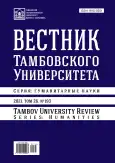The accession of the Second Republic of Austria to the UN after the end of World War II (1955)
- Authors: Kozyakova N.S.1
-
Affiliations:
- Moscow Region State University
- Issue: Vol 26, No 193 (2021)
- Pages: 254-261
- Section: FOREIGN COUNTRIES’ HISTORY
- URL: https://journal-vniispk.ru/1810-0201/article/view/298433
- DOI: https://doi.org/10.20310/1810-0201-2021-26-193-254-261
- ID: 298433
Cite item
Full Text
Abstract
We examine the problems that occupied the main place in Austria’s foreign policy in the mid-1950s of 20th century and characterized its role in international relations during the specified period. The role of Austria in the international arena has increased the country’s entry into the path of neutrality. It also opened up wide opportunities for it to participate in the activities of various international organizations extensively. Using the method of source analysis, the active participation of Austria in the work of the UN is considered, its authority and support for the sufficient work of this organization, which allowed it to be elected for three years as a member of the main body of the UN – a member of the Economic and Social Council in 1963 and 1976, in 1973 and 1974 – a member of the UN security, and in 1972 it became a permanent member of the UN Security Council. According to Austria’s first statement to the Security Council, the country planned to provide the widest possible extent of its impartial services to the UN’s main political body, using the wide opportunities given to it by its independence and neutrality. Having analyzed the main directions and aspects of Austrian foreign policy in the second half of the twentieth century, we conclude that, having adopted a justified course in foreign policy in 1955, based on permanent neutrality, the Second Austrian Republic further has provided the guarantee and basis of its independence.
Keywords
About the authors
N. S. Kozyakova
Moscow Region State University
Author for correspondence.
Email: nkozyakowa@yandex.ru
ORCID iD: 0000-0002-3271-8215
Candidate of Political Sciences, Associate Professor of Political Science and Law Department
24 Very Voloshinoy St., Mytishchi 141014, Moscow Region, Russian FederationReferences
- Mayorov S. (ed.-compiler). Vneshnyaya politika Sovetskogo Soyuza v period Otechestvennoy voyny. Doku-menty i materialy: v 3 t. T. 1. 22 iyunya 1941 g. – 31 dekabrya 1943 g. [Foreign Policy of the Soviet Union during the Patriotic War. Documents and Materials: in 3 vols. Vol. 1. June 22, 1941 – December 31, 1943]. Moscow, 1946, 417 p. (In Russian).
- Zhiryakov I.G., Makarenkov M.V. Avstriya i evropeyskaya ekonomicheskaya integratsiya v kontekste otno-sheniy Zapad–Vostok [Austria and European Economic Integration in the Context of West – East Relations]. Moscow, Publishing House of Moscow Region State University, 2016, 220 p. (In Russian).
- Rolinek S. Identität und Zugehörigkeit: Lebenswelten und Perspektiven jüdischer Flüchtlinge in der US-Zone Österreichs (1945–1955). Salzburg, 2002, 253 S. (In German).
- Zemanek K. Das neutrale Österreich in den Vereinten Nationen. Österreichische Zeitschrift für Außenpolitik, 1961, vol. 2 (1), S. 10-25. (In German).
- Kirchschläger R. Österreich und die Vereinten Nationen: Vortrag am 24. Oktober 1972 vor der Österrei-chischen Liga der Vereinten Nationen. Wien, Bundesministerium f. Auswärtige Angelegenheiten, Abt. f. Presse u. Information, 1972, 9 S. (In German).
- Strasser W. Österreich und die Vereinten Nationen: eine Bestandsaufnahme von 10 Jahren Mitgliedschaft. Wien, Braumüller Publ., 1967, 439 S. (In German).
- Blechner H. Die Vereinten Nationen und Österreich. Wien, Österreichische Liga für die Vereinten Nationen Publ., 1953, 64 S. (In German).
- Jankowitsch P. Österreich im Sicherheitsrat der Vereinten Nationen: Vortrag v. Botschafter Peter Jankowitsch, Ständiger Vertreter Österreichs bei den Vereinten Nationen, am 28. Mai 1973 vor d. Österr. Liga d. Vereinten Nationen. Wien, Bundesmin. f. Auswärtige Angelegenheiten, Abt. f. Presse u. Information, 1973, 18 S. (In Ger-man).
- Troy J. Im Dienst der internationalen Gemeinschaft – Österreich in den Vereinten Nationen. 1. Aufl. Innsbruck, Innsbruck University Press, 2013, 175 S. (In German).
- Bystricky J.C. Der Beitrag der Republik Österreich und seiner Armee im Rahmen der Vereinten Nationen für den Weltfrieden. Salzburg, Inst. f. Grundlagenforschung d. Erwachsenenbildung im Ring Österr. Bildungswerke Publ., 1968, 12 S. (In German).
- Figl L. Reden für Österreich. Wien, 1965, 172 S. (In German).
- Murber I. Die ungarische Revolution und Österreich 1956. Wien, Czernin Publ., 2006, 544 S. (In German).
- Hauser G. Österreich – dauernd neutral? Wien, Braumüller Publ., 2002, 151 S. (In German).
- Ardelt R.G. Österreich – 50 Jahre Zweite Republik: Österreichischer Zeitgeschichtetag 1995. 22. bis 24. Mai 1995 in Linz. Innsbruck, Studien-Verl. Publ., 1997, 551 S. (In German).
- Kreisky B. Zwischen den Zeiten: Erinnerungen aus 5 Jahrzehnten. 4. Aufl. Wien, Kremayr und Scheriau Publ., 1987, 494 S. (In German).
Supplementary files








